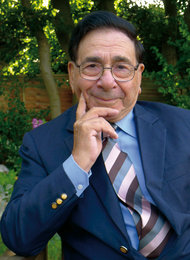
“Roy Y. Calne” Source of caption and photo: online version of the NYT interview quoted and cited below.
(p. D2) Sir Roy Calne is a pioneer of organ transplants — the surgeon who in the 1950s found ways to stop the human immune system from rejecting implanted hearts, livers and kidneys. In 1968 he performed Europe’s first liver transplant, and in 1987 the world’s first transplant of a liver, heart and lung.
. . .
When you were studying medicine in early-1950s Britain, what was the prevailing attitude toward organ transplantation?
It didn’t exist! While a medical student, I recall being presented with a young patient with kidney failure. I was told to make him as comfortable as possible because he would die in two weeks.
This troubled me. Some of our patients were very young, very deserving. Aside from their kidney disease, there was nothing else wrong with them. I wondered then if it might be possible to do organ transplants, because kidneys are fairly simple in terms of their plumbing. I thought in gardening terms. Might it not be possible to do an organ graft, replacing a malfunctioning organ with a healthy one? I was told, “No, that’s impossible.”
Well, I’ve always tended to dislike being told that something can’t be done. I’ve always had a somewhat rebellious nature. Just ask my wife.
For the full interview, see:
CLAUDIA DREIFUS, interviewer. “A CONVERSATION WITH ROY Y. CALNE; “I’ve always tended to dislike being told that something can’t be done. I’ve always had a somewhat rebellious nature.”” The New York Times (Weds., November 27, 2012): D2.
(Note: ellipsis added; bold in original to indicate interviewer (Dreifus) question.)
(Note: the online version of the interview has the date November 26, 2012 and has the title “A CONVERSATION WITH ROY Y. CALNE; Organ Transplant Pioneer Talks About Risks and Rewards.”)
